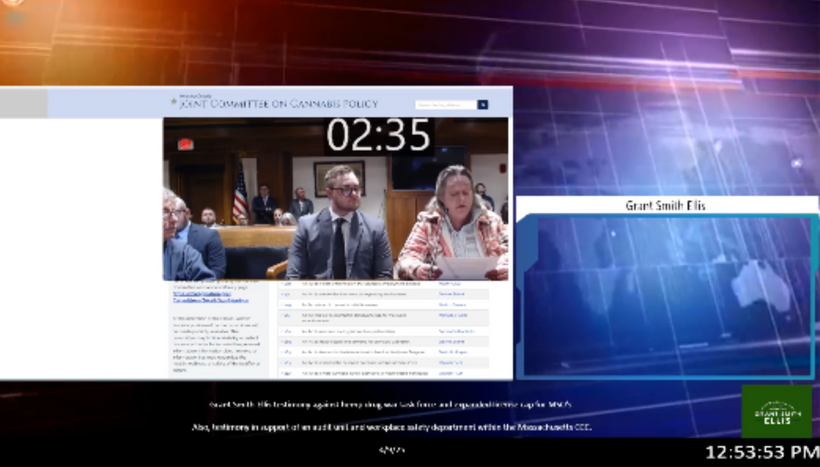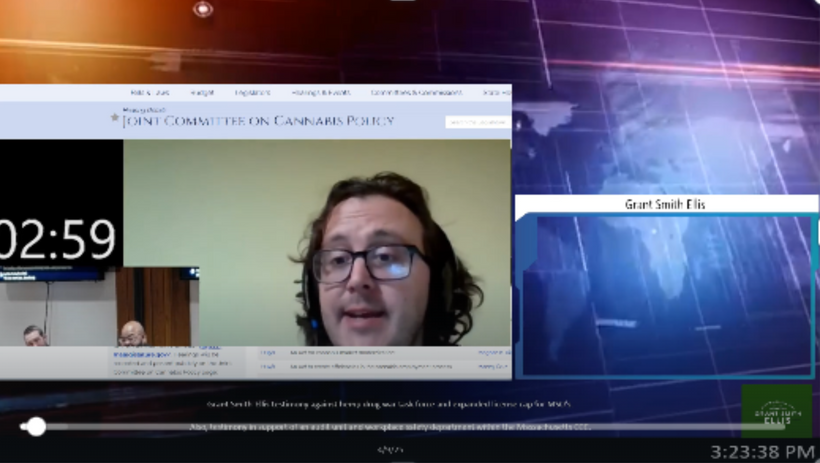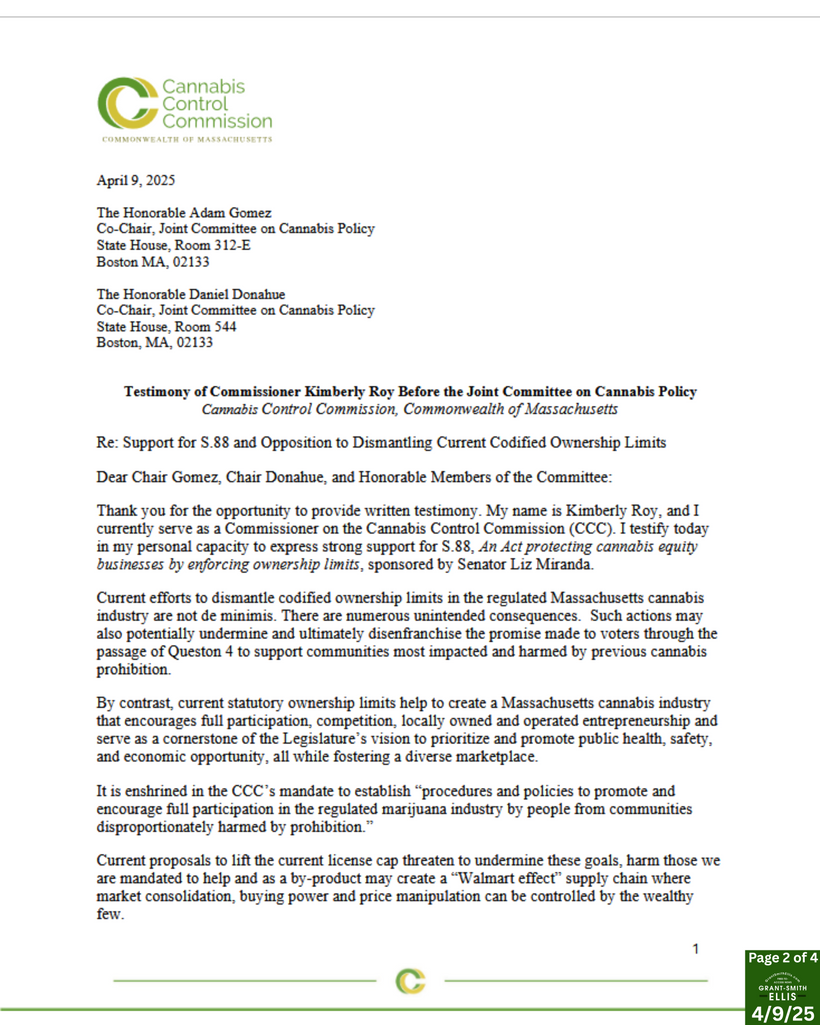By: Grant Smith-Ellis
Date: 4/9/25
Time: 6:00pm ET
The few remaining grassroots advocates in the Massachusetts adult and medical use space stormed Beacon Hill with a vengeance during Wednesday’s much-anticipated hearing related to reform of the state’s troubled Cannabis Control Commission (“CCC”), casting “Lorna’s Law” (H194) into the headlines, and centering the unheard screams of workplace saftey advocates within the gaze of lawmakers at long last.
After what was, hands down, the most powerful testimony of the morning sessions from today’s hearing related to consumer and workplace safety, there was not a lawmaker in the committee room who was left thinking about anything but the tragic story of Lorna McMurrey, her mother’s “entire world,” taken at age 27 due to the dangerous working conditions within the now-shuttered Holyoke facility operated by MSO Trulieve.
In shocking moments, Lorna’s mother also revealed that Trulieve had a locked facility and did not permit medics to enter the building in order to save McMurrey’s life.
“I hope you support this legislation to prevent any more harm to both workers and the public. My daughter Lorna started working at a cannabis production facility in May of 2021. The facility had locked doors, video cameras, and no windows. And when Lorna collapsed they wouldn’t even let the first responders to go in and save her,” said Laura Bruneau to a panel of lawmakers (who hung on her every word).
“I urge you to support bill H194 and take meaningful action to create safer workplaces and protect lives. Please honor Lorna’s memory by making sure this doesn’t happen to anyone else.”
“Lorna was my world, and I have no world anymore,” Bruneau concluded, in remarks that brought this little towel to tears (and I’m certain there was not a dry in that hearing room at that moment).

Laura Bruneau (right), the mother of Lorna McMurrey, speaks at a Beacon Hill hearing that took the State House by storm and brought “Lorna’s Law” (H194) to the center of public attention. Danny Carson (center), Lorna’s dear friend, awaits his turn to speak. (Published via Patreon.com/GrantSmithEllis, 4/9/25)
I. “Lorna’s Law” (H194) Takes Center Stage, As Advocates Rally To Prevent More Tragic Deaths Within A Profit Driven Industry
“My name is Laura Bruneau, and I am speaking as the mother of Lorna McMurrey,” began Bruneau’s powerful remarks (which can be read, in full, below, as transcribed by towel);
“Lorna tragically passed away at the age of 27 while working at a [Trulieve] cannabis facility in Holyoke in 2022. As a citizen of West Springfield I am here to testify in support of H194. I am testifying today because my daughter Lorna’s death was preventable.”
“I hope you support this legislation to prevent any more harm to both workers and the public. My daughter Lorna started working at a cannabis production facility in May of 2021. The facility had locked doors, video cameras, and no windows. And when Lorna collapsed they wouldn’t even let the first responders to go in and save her.”
“On November 9, 2021, Lorna was working in a small room in other workers, grinding and rolling cannabis material. On that day, Lorna suffered her first occupational asthma attack. On the next day, she went back to work, in the same place where she had the first asthma attack.”
“Eight weeks later, on January 4, 2022, Lorna suffered a second asthma attack and collapse at work. After three agonizing days in the hospital, I watched my daughter take her last breath. Lorna’s asthma attach was caused by occupational exposure to cannabis dust.”
“Lorna’s story is not an isolated event. Workers and consumers are vulnerable because saftey regulations are lacking behind rapid industry growth. It in unacceptable for companies to prioritize profits over people’s saftey. Workers and consumers need to be protected. That is why this bill is crucial.”
“Lorna was more than her job. She was a loving and compassionate daughter, a friend to many, and an animal lover who cherished her dog and cat. Her life mattered. The lives of every hardworking indvidual in this industry matter. And the lives of every consumer who buy these products matter.”
“I urge you to support bill H194 and take meaningful action to create safer workplaces and protect lives. Please honor Lorna’s memory by making sure this doesn’t happen to anyone else.”
“Thank you for your time. Lorna was my world, and I have no world anymore.”
Along with Lorna’s mom, Danny Carson (@DannyMassachusetts), McMurrey’s close friend and a champion of the downtrodden within otherwise non-existent patient and consumer advocacy circles around the Commonwealth, also spoke about the importance of lawmakers forcing the CCC to take steps to protect the public from dangerously contaminated products (Danny found 46% of products tested via off-the-shelf sampling had levels of total yeast and mold above the 10,000 CFU/g threshold allowed per state law) and to protect workers (both within the CCC and the larger industry) from dangerous working conditions and exploitative corporate practices.
Said Danny, when speaking to lawmakers at a hearing that must feel like the first step on the path to a long-deferred dream,
“Thank you for this opportunity to address you today in strong support of Bill H-194. My name is Danny Carson, and I’m here today representing the Coalition for Cannabis Worker Safety, which I co-founded following the tragic passing of my friend Lorna McMurray. At 27 years old, she passed away from preventable workplace hazards in 2022, and in my years of advocating for workplace safety since her passing, I’ve heard numerous harrowing accounts from workers across Massachusetts.
“They’ve shared stories of alarming symptoms, inadequate PPE availability, and retaliation when raising safety concerns with their leadership teams. Recently, dozens of affected workers from revolutionary clinics in Fitchburg have come forward expressing serious health concerns, including respiratory illnesses and rare tumors. It is clear that workplaces in Massachusetts cannabis industry are not safe, and these hazards are unfortunately being passed down to consumers and patients.”
“Mold poses a significant threat within this industry. Prevalent and grow facilities of all sizes, regardless of whether they’re operated by multi-state operators or small entities. Workers have long faced and raised these concerns about the dangers associated with mold exposure, and over the last six months, I have personally initiated testing on over 100 off-the-shelf cannabis products and have them tested for total yeast and mold.”
“Shockingly, 47 percent of those products exceeded the safe threshold set by this state. This raises serious questions about the oversight of the CCC in ensuring product safety and worker safety. The presence of contaminated products does not only jeopardize consumers and patients, but it underscores the occupational risk that’s faced by cannabis workers.”
“Imagine working in a poorly ventilated small room without adequate PPE, grinding moldy cannabis for eight hours a day, five days a week, for a year. This is the stark reality of a lot of these workers in our industry, and they are facing serious health consequences because of that. The CCC is the sole authority capable of addressing this critical issue and prevent further harm from workers and consumers alike.
Therefore, it is imperative that they establish a dedicated department of workplace and consumer safety without delay. Thank you for considering my testimony today. I urge you to support Bill H194 and take decisive action to safeguard the health and well-being of all those involved in the cannabis industry,” Danny concluded.
It was wonderful, in so many ways, that Danny and Lorna’s mom kicked off today’s hearing, in that regard.
Microbiologist Mike Esposito also took to the State House on Wednesday in support of “Lorna’s Law” (H194), and this little towel was similarly impressed with Mike’s passion and knowledge.
Mike delivered excellent testimony as to why the Massachusetts CCC creating an internal workforce and consumer safety department is so crucial, in particular as to ongoing threats posed by dangerously contaminated products.
“I’m a cannabis microbiologist, plant biologist, and pathologist, and a former cultivation employee within two different cultivation states in Massachusetts,” Esposito began.
“I’m speaking to you today not as a representative of any company, but as an individual to strongly express support for Bill H-194, an act relative to the Massachusetts Cannabis Control Commission, former Department of Workplace and Consumer Safety. As things currently stand in the industry, we really only take measurements at two points during the process of cannabis production. That is source water and growing media all the way upstream as far as possible, and then the end point COA that’s generated before product can go to sales, which is on the opposite end, the furthest downstream point in production,” he then told lawmakers.
“I believe we have a pretty glaring void throughout basically the entire processing step there, and because cannabis doesn’t really, not necessarily beholden to any GMP for process regulation, I think there is a lot of huge risk to the workforce and even the consumer base that is kind of neglected through ignoring this portion of production. A COA at the end point really only measures the amount of living microbes on material and a very incredibly narrow band of mycotoxins. Because we know you can remediate products, we know lab shopping is really prevalent, this does not necessarily tell us anything about the safety of the individuals working with this product, and it completely ignores any antigens, mycotoxins, bacterial toxins produced through remediation that are going to be impacting sensitive patient basis, immunocompromised individuals,” Esposito said, crescendoing as only a scientist can.
“The spirit of quality indicator testing, like total yeast and mold, total aerobic bacteria, is not only to provide you an end point idea of what the product looks like going to the consumer, but to also inform you on your process control, let you know if there is actual quality standards being met in production. Not only does an end point COA only measure that one gram of material going to the consumer, which is actually kind of an insanely small amount of material, any other industry, corn, peanuts, would crack up if they knew you didn’t have to grind 250 grams. Not only does that only inform what the product is on the shelf, it ignores everything that’s happening in the grow,” came the shocking conclusion for lawmakers (who quickly, thanks to Mike’s easy-to-understand phrasing, came to understand just how dangerous it can be for products to flow through a supply chain with minimal oversight and little compliance testing).

Microbiologist Mike Esposito speaks at a Beacon Hill hearing that took the State House by storm and brought “Lorna’s Law” (H194) to the center of public attention. (Published via Patreon.com/GrantSmithEllis, 4/9/25)
“We know that cannabis is a relatively new agricultural industry, legally, so we don’t have a large clinical database, but we can look at proxy industries, things like corn production, wine production, berry production, all have well-known occupational diseases, like wine grower’s lung, berry sorter’s lung, which are caused by specific fungus like Botrytis cinerea (commonly known as gray mold), which you know is incredibly prevalent in cannabis. We know that responsive investigation of a workplace, say after somebody has an asthma attack, if you go in the next day, all you really measure is how good the HVAC is, not what the conditions were during that, and then kind of to wrap it up, I believe that if we don’t act now, we’re going to see, not only in the short term, more tragic and preventable loss of life, but over the course of the following years and decades, we will see swaths of the workforce infected with occupational diseases like cannabis trimmer’s lung,” said Esposito, when explaining to lawmakers why supporting Lorna’s law, in the short term, is of crucial importance (and, in fact, will save lives).
Other advocates also provided impassioned testimony in support of Lorna’s law, and a few others, still, railed against a corporate-backed plan to expand the number of licenses that large MSO’s can control (while, at the same time, stopping the issuance of all new such licenses).
II. Advocates Rail Against Plan To Allow MSO Market Takeover, Demand Existing Ownership and Control Caps Be Imposed
CCC Commissioner Kimberly Roy, and local hero, also weighed in to support the only piece of legislation considered at today’s hearing that would enforce a cap on existing ownership and control limits for powerful Multi-State Operators (MSO) seeking to consolidate control of the market (S88).

A letter from CCC Commissioner Kimberly Roy, in her personal capacity, as to bill S88 and the importance of lawmakers supporting enforcement of existing ownership license caps in the state (rather than allowing giant MSO’s to expand that cap while, at the same time, stopping the issuance of all new such licenses, therein creating a market oligopoly). (Published via Patreon.com/GrantSmithEllis, 4/9/25)
Said Roy, testifying in written form in her personal capacity,
“I testify today in my personal capacity to express strong support for S.88, An Act protecting cannabis equity businesses by enforcing ownership limits, sponsored by Senator Liz Miranda. Current efforts to dismantle codified ownership limits in the regulated Massachusetts cannabis industry are not de minimis. There are numerous unintended consequences. Such actions may also potentially undermine and ultimately disenfranchise the promise made to voters through the passage of Question 4 to support communities most impacted and harmed by previous cannabis prohibition.
By contrast, current statutory ownership limits help to create a Massachusetts cannabis industry that encourages full participation, competition, locally owned and operated entrepreneurship and serve as a cornerstone of the Legislature’s vision to prioritize and promote public health, safety, and economic opportunity, all while fostering a diverse marketplace.
It is enshrined in the CCC’s mandate to establish “procedures and policies to promote and encourage full participation in the regulated marijuana industry by people from communities disproportionately harmed by prohibition.”
Current proposals to lift the current license cap threaten to undermine these goals, harm those we are mandated to help and as a by-product may create a “Walmart effect” supply chain where market consolidation, buying power and price manipulation can be controlled by the wealthy few.”
Roy went on to say,
“S.88, An Act protecting cannabis equity businesses by enforcing ownership limits will promote fairness, transparency and accountability in the Massachusetts regulated industry by:
• Mandating a comprehensive CCC ownership audit every five years
• Explicitly authorize the State Auditor and Inspector General to investigate compliance
• Establishing a whistleblower process and anonymous tip line
• Increase transparency through improved public access to ownership data.”
On a day when Beacon Hill saw Lorna’s Law (H194) emerge as a front-runner to protect workplace and consumer safety, Roy’s remarks in defense of market fairness will only be further music to the ears of the smattering of grassroots advocates (not corporate sell outs) who remain in the state.
For that, I deem Commissioner Roy an honorary towel. That is a very high honor in the towel world. I am sure the Commissioner is thrilled (and probably laughing as she reads this right now).
I should send her some kind of towel-based plaque.
Anyway, read Roy’s full letter here (or via the images that follow) – https://drive.google.com/file/d/1LUjOodRXZ5xBTS2aWDy6BHRJEbjP_ulM/view?usp=sharing
III. Impacts Of MSO Plans To Lift Massachusetts Ownership Cap, Prevent Issuance Of New Licenses, Poses Direct Threat To Small, Local, Equity Companies, Experts Say
Other advocates, including Cat Packer (former Executive Director of the City of Los Angeles Department of Cannabis Regulation and I currently serve as an advisor to the Parabola Center on Law and Policy) and members of MassEON, also testified as to the importance of enforcing existing license caps in the Commonwealth, as opposed to allowing MSO’s to buy up more small companies, in the context of the danger posed by such corporate consolidation when looking at other state’s who have allowed such takeovers.

Cat Packer, former Executive Director of the City of Los Angeles Department of Cannabis Regulation and I currently serve as an advisor to the Parabola Center on Law and Policy, speaks at a Beacon Hill hearing in support of enforcing, rather than expanding, existing per-entity ownership and control caps in Massachusetts. (Published via Patreon.com/GrantSmithEllis, 4/9/25)
Said Packer, when testifying to the Committee,
“I’ve had the privilege of working on cannabis policy and market regulation for nearly a decade and hope to bring that experience and expertise to bear in my testimony today. I urge this committee to oppose any legislation that would increase or eliminate caps on the number of licenses that a single individual or entity may own, House Bill 158, Senate Bill 99, House Bill 149, Senate Bill 78, House Bill 174, House Bill 171, Senate Bill 75, and House Bill 160. I also urge you to support Senate Bill 88, legislation that protects and prioritizes small, independently owned, and equity-centered cannabis businesses.
In order to protect and expand opportunities for small businesses, it is essential that governments continue to use tools that foster a diverse and inclusive marketplace. In my experience, one of the most effective tools is limiting the number of licenses any one business can control. Massachusetts has long been a leader in modeling how ownership caps and other regulatory measures can be used to advance economic equity, and we’ve seen the consequences of removing these protections in other states.
In markets where larger operators and their trade associations representing their interests dominate, equity licensees have consistently struggled to gain meaningful market share. Rather than remove critical protections, I urge you to pair the existing caps with policies that help these businesses scale, access capital, build value, and have meaningful opportunities to sell or transfer ownership when they choose, not simply allowing others in this moment to profit from their continued struggle. Massachusetts has an opportunity to strengthen its commitment to equity by rejecting these policies that would open the door to further concentration of ownership.
I urge this committee to act with urgency and attention to ensure that Massachusetts does not become another cautionary tale of consolidation, but instead continues to lead as a model for building a fair, competitive, and inclusive cannabis industry that supports local and small businesses, workers, and consumers,” Packer concluded.
 Kevin Gilnack, Jeff Similien and Ruben Seyde from MassEON speak at a Beacon Hill hearing in support of enforcing, rather than expanding, existing per-entity ownership and control caps in Massachusetts. (Published via Patreon.com/GrantSmithEllis, 4/9/25)
Kevin Gilnack, Jeff Similien and Ruben Seyde from MassEON speak at a Beacon Hill hearing in support of enforcing, rather than expanding, existing per-entity ownership and control caps in Massachusetts. (Published via Patreon.com/GrantSmithEllis, 4/9/25)
Use this link to find more information about Lorna’s Law (H194) – https://malegislature.gov/Bills/194/H194
Find more about the bill to impose existing per-entity ownership and control caps (S88) here – https://malegislature.gov/Bills/194/S88
Use this link to find your Senator and State Rep. in order to send them an email, or make a call, in support of Lorna’s Law (tell them you support H194 along with S88, and that you oppose all attempts to life license caps in the cannabis industry) – https://malegislature.gov/Search/FindMyLegislator